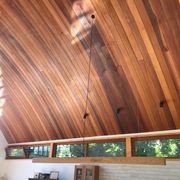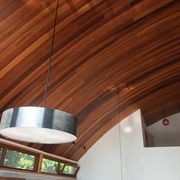WR Cedar Panelling & Sarking
ITI NZ- CategoryTimber
- BrandITI Timspec
- WarrantyN/A
Projects featuring WR Cedar Panelling & Sarking
More from ITI NZ
About the
Seller
Timspec was established in 1990 as a wholesaler of specialty timber and was wholly New Zealand owned. In March 2019 Timspec was acquired by ITI Australia and became ITI Timspec LTD.
Today we import, export, and wholesale a huge range of timber to builders, joiners, home owners, floor layers, landscape builders and furniture manufacturers. We pride ourselves on being environmentally responsible and strive to source the most sustainable timber options available. Timber stocked includes species from North America, South America, Europe, Africa, South East Asia, Australia, and New Zealand's exotic as well as indigenous species.
The ITI Timspec team are extremely knowledgeable about the various types of timber, treatments and uses available and are happy to help you in choosing the right product for your project.
- ArchiPro Member since2016
- LocationView all locations (+2)
- More information



















